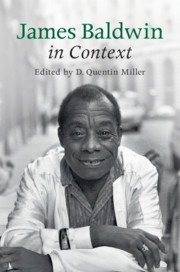Book contents
- James Baldwin in Context
- James Baldwin in Context
- Copyright page
- Contents
- Contributors
- Introduction: James Baldwin in Context
- Part 1 Life and Afterlife
- Part 2 Social and Cultural Contexts
- Part 3 Literary Contexts
- Chapter 19 The Protest Essay Tradition
- Chapter 20 Baldwin and the Black Arts Movement
- Chapter 21 Baldwin and the Rhetoric of Confession
- Chapter 22 The Poetics of Beautiful Blackness On Baldwin and Négritude
- Chapter 23 Mid-Century Theater
- Chapter 24 Sex and the Twentieth-Century Novel
- Chapter 25 Responding to Richard Wright
- Chapter 26 Baldwin’s Literary Friendships
- Chapter 27 Reviewers, Critics, and Cranks
- Chapter 28 Baldwin’s Collaborative Dance
- Chapter 29 Baldwin’s Literary Progeny
- Index
Chapter 27 - Reviewers, Critics, and Cranks
from Part 3 - Literary Contexts
Published online by Cambridge University Press: 12 July 2019
- James Baldwin in Context
- James Baldwin in Context
- Copyright page
- Contents
- Contributors
- Introduction: James Baldwin in Context
- Part 1 Life and Afterlife
- Part 2 Social and Cultural Contexts
- Part 3 Literary Contexts
- Chapter 19 The Protest Essay Tradition
- Chapter 20 Baldwin and the Black Arts Movement
- Chapter 21 Baldwin and the Rhetoric of Confession
- Chapter 22 The Poetics of Beautiful Blackness On Baldwin and Négritude
- Chapter 23 Mid-Century Theater
- Chapter 24 Sex and the Twentieth-Century Novel
- Chapter 25 Responding to Richard Wright
- Chapter 26 Baldwin’s Literary Friendships
- Chapter 27 Reviewers, Critics, and Cranks
- Chapter 28 Baldwin’s Collaborative Dance
- Chapter 29 Baldwin’s Literary Progeny
- Index
Summary
James Baldwin began his writing career as a reviewer and critic and continued throughout his life to assess other writers while being the recipient of abundant praise as well as some measured and scathing criticism. Like Baldwin’s fiction and nonfiction, which resist easy categorization, so too do his reviews and opinions about other writers, and so too do the varied responses to his own work in his lifetime and beyond. The purpose of this chapter is to examine some of the themes in Baldwin’s reviews in relation to his work and the assessments it received. To accomplish this task in such a short scope, I will discuss a small sample of Baldwin’s most acerbic and cranky reviews and some of the representative enthusiastic and negative views of his writing during his lifetime. By doing so, I hope to show how looking at Baldwin as a reviewer and reviewed subject can contribute to better understanding his positions on “serious” literature and literary aesthetics, and his relations to his African American contemporaries. For instance, in “Autobiographical Notes” Baldwin describes his early assignments as a reviewer in rather dismissive terms: “I started … writing book reviews—mostly, as it turned out, about the Negro problem, concerning which the color of my skin made me automatically an expert.” He continues: “By the time I was twenty-four I had decided to stop reviewing books about the Negro problem—which, by this time, was only slightly less horrible in print than it was in life.” Baldwin’s feelings about his role as a reviewer – particularly of books on black history or black-white relations – have gone largely unexplored in the criticism. This chapter also reexamines, in connection to reviews of Baldwin’s writing, some traditional perceptions of his essays and fiction. Clearly, the reviews are products of their historical moments – reflecting changing literary and social expectations – but also serve as prescient reminders of how Baldwin directly influenced the literary and political America he wrote about in his work.
- Type
- Chapter
- Information
- James Baldwin in Context , pp. 287 - 300Publisher: Cambridge University PressPrint publication year: 2019

